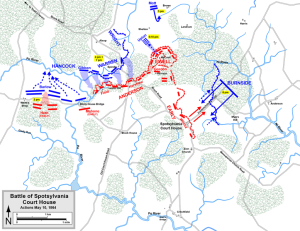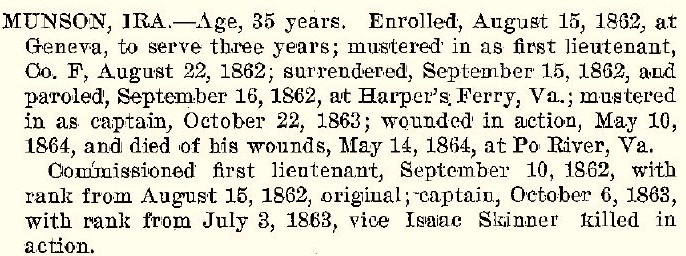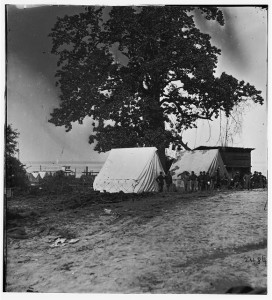he replied that he should never leave the boys whom he had induced to enlist, while he was able to do duty.
The big notebooks of newspaper clippings from the Civil War era in the Seneca Falls, New York public library has a lot of “cuttings” from May and June 1864 about casualties from the several Finger Lakes area units serving in Virginia. Here’s an example from a Seneca County, New York paper in 1864:
Killed and Wounded.
We regret to learn that the list of casualties among the volunteers from our county, in the recent bloody but undecided contest between Grant and Lee, is unusually large. Capt. IRA MUNSON, of the 126th regiment, was killed while gallantly leading his company. Capt. MUNSON was the eldest son of Ebenezer Munson of Tyre, and a young man of character and intelligence. His remains arrived here on Thursday.
In the 49th regiment the number killed and wounded is very large. …
According to the New York State Military Museum the 126th was fighting in Francis Barlow’s Division 150 years ago:
The 126th ha[v]ing been transferred to Barlow’s (1st) division, entered the spring campaign of 1864 with less than 300 men, of whom 100 were detailed at headquarters as a provost-guard. Its casualties at the Wilderness were 5 killed, 62 wounded and 9 missing; and at Po river and Spottsylvania, 6 killed, 37 wounded and 7 missing.
As you can read at Civil War Daily Gazette 150 years ago today Barlow’s Division was out on the Union right flank, south of the Po River, where they got hit hard by Henry Heth’s rebels. Barlow “paid dearly” but managed an orderly withdrawal.
The following cutting from a Seneca County, New York newspaper has “Sept 1 1864” handwritten in ink:
OBITUARY.
DIED – Of his wounds, in the hospital at Washington, May 14th, 1864, Major IRA MUNSON, of Tyre, aged 35 years.
Maj. MUNSON enlisted in the 126th N.Y.V., in the Summer of 1862, and shared in all the hardships and vicissitudes of that unfortunate regiment, except the battle of Gettysburg, at which time he was ill.
He was chosen 1st Lieut. of Co. F, which office he held till the death of Capt. Sheimer [Shimer, at Gettysburg], when he became Capt. He was promoted to the office of Major just before his death, his friends receiving the papers subsequently.
At the battle of the Wilderness his company was in the terrible skirmish line, and he was struck by a ball in the hip, while cheering on his men. He was borne off the field by his faithful men, and after a weary ride of 48 hours in an ambulance, reached Belle Plain, whence he was sent to Washington, where he lived but a few hours.
Maj. Munson was a true soldier, brave and intrepid without being rash or imprudent. He was generous and kind as a father to the men of his command; courteous and respectful to his superiors in office, and as a consequence he was loved by the former, and honored by the latter.
Many mere boys were entrusted to his care by their parents, for they knew he would be a friend and guardian to their sons, and their confidence was not misplaced. His elevation in rank did not make him tyrannical. And when advised by his surgeon to resign on account of ill health, he replied that he should never leave the boys whom he had induced to enlist, while he was able to do duty.
His fine talents, his noble and generous heart, his cheerfulness and suavity of manners, won him friends wherever he went.
His body was embalmed and sent home. Appropriate funeral services were held at the M.E. Church, Tyre – sermon by Rev. E. Hotchkiss, from Deut. 4:22.
A large circle of relatives and friends mourn his early death. But he died nobly in a noble cause. He loved his country, and like many another hero, he gave to her his life.
P.E.S.
You can read more about Ira Munson at The Munson Record (pages 229-231). As a young man he spent time in California and Nicaragua before returning to the States in, I believe, 1857.
Deuteronomy 4:22 quotes Moses:
“For I will die in this land, I shall not cross the Jordan, but you shall cross and take possession of this good land.”
Hal Jespersen’s map of May 10th at Spotsylvania is licensed by Creative Commons



